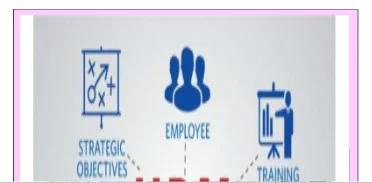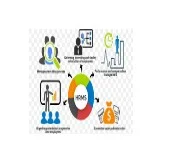Responsibilities of Hr Managers in Talent Management

Human resource management
The HR managers are responsible to manage talent, performance of the employees and organisational culture, which is necessary to maximise the overall performance of the organisation. For managing talent, it is necessary for the HR manager to arrange training program and review the participation rate of the employees. Also, the cost per hire, monitoring the productivity of the staff and acceptance rate among the employees are the indicators, through which the manager is able to manage the employee’s talent in the workplace (Collings, Wood and Szamosi, 2018). If you require assistance with HRM dissertation help, exploring all these indicators and their impact on talent management can be the most valuable area of research.
For performance management, it is also the role of the manager to maintain the performance of the employees by encouraging them through providing monetary and non-momentary rewards and benefits so that it would be possible to create vales for them. Continuous support and monitoring the performance, rewards and compensations are necessary as per the HR matrix to manage string employee base.
As per the HR matrix, it is necessary to manage organisational culture to retain the employees for long run. Implementing the HR policies and practice, protecting the staff with safety and security, flexibility at the workplace and positive and

Maslow’s hierarchy of needs is effective HR theory through which it is possible for the manager in HR department to identify the needs and preferences of the employees and maximise their values in the workplace. As per the theory, there are five needs which are physiological needs; safety needs belongingness and love needs, self esteem and the needs of self actualisation.

It is necessary to fulfil the physiological needs of the employee which are basic needs including food, shelter, air and warmth and it is also essential to maximise the safety needs by providing safe environment to work. Developing strong relationship at the workplace and building trust and loyalty is also helpful to fulfil the need of belongings and feeling of accomplishment at the organisation is also fruitful to certain the staff in long run (Wilton, 2016).
Herzberg’s two factor theory is another important HR theory which introduced two major factors, motivational and hygiene. The motivational factors are achievement, recognition at workplace, personal responsibility, advancement and personal growth at the workplace which are effective to motivate the people and encourage their innovation to maximise organisational performance (Guest, 2017).
The hygienic factors are wage and salary structure, supervisor quality, exiting HR policies and rules, co-worker relations and the working condition which are also crucial factor to retain the staff in long run and create values for them (Sparrow, Brewster and Chung, 2016).
Analysing the findings
HR strategies and planning are effective for the organisation to manage the good working culture so that the management team can create values for the employees and retain them for long run. The managers try to encourage the employee’s innovation and creativity and give them freedom to perform better and this is effective to motivate the staff to maximise their performance.
The managers also aim to provide performance related pay and rewards as well as incentives which also encourage the employees for better performance so that they can earn more in the workplace. Continuous improvement of the performance and motivation are hereby playing a crucial role to improve the performance and retain the experienced staff in long run.
The HR managers also aim to develop suitable organisational culture, with harmony and mutual trust which encourage the staff to perform collaboratively and in this regard the organisations aim to enhance communication with all the staff to improve mutual trust and develop string corporate bonding to perform together (Armstrong and Taylor, 2020).
The managers also try to manage talent at the workplace by arranging training and development program, developing group discussion session and general meeting so that the employees can share their feeling and experience and participate efficiently to maximise the organisational performance.
The HR manager also develops continuous monitoring process and evaluation of the performance through performance indicators such as company’s growth and profitability, quality of customer service, improving analysis, maximising use of organisational resources and capabilities and enhancing organisational creativity and innovation, which are effective for the organisations to measure performance of the staff and encourage them continuously for better performance (Rees and Smith, 2017)
The manager in HR department is also responsible to enhance communication and cooperation in the workplace and in this regard they try to arrange group discussion session, general meeting and encourage the workers for better conversation so that they can share their thoughts and experience with each other for better performance.


HR management planning and strategies are effective for the organisations to strengthen their employee’s base and manage the experience workforce in long run, so that the organisational performance can be maximised well in long run.

HR matrix is also beneficial to develop proper HR planning by reviewing the roles and individuals responsibilities of the HR managers and other staff in the HR department who are playing crucial role to review the organisational vision, develop proper organisational culture and strategic planning to manage the workers at the workplace and lead them towards achieving future success.
It is necessary for the HR management team to implement the HR policies and rules in the workplace for improving the HR management where the non-discriminatory policies and implementing Equality Act 2010 is effective to protect employee’s morale and treat the people fairly and equality at the workplace.
Implementing the Data Protection Act 1998 is necessary to protect the personal data and information of the employees and it further improves the security of the staff at the organisational workplace.
The HR managers also needs to enhance the performance of the employees by creativity and innovation and it would be effective to arrange technical training program to enhance the skill and knowledge of the staff and encourage them to renovate the organisational practice for future sustainable achievement.
For successful retention of the experienced staff and management of the workers, it is essential for the management team to provide continuous support and direct the employees so that they become interested and encouraged to perform better and contribute positively in near future.
Take a deeper dive into Report and Presentation with our additional resources.
- 24/7 Customer Support
- 100% Customer Satisfaction
- No Privacy Violation
- Quick Services
- Subject Experts



